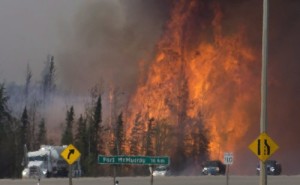Our hearts go out to the tens of thousands of people who have been displaced by the forest fires in Fort Mac. Many friends and some family members have been directly impacted by this devastation.
been directly impacted by this devastation.
Dealing with times of crisis and trauma are difficult! People tend to experience a number of mental and emotional symptoms, including disbelief and shock. There is often fear and anxiety, especially with all the unknowns that people are facing. Sometimes people will have flashbacks and nightmares related to what they witnessed. This can cause trouble sleeping, mood swings, tearful outbursts, and lack of focus and concentration.
Some normal physical reactions include: aches and pains, like headaches, sleeplessness, rushes of panic/anxiety, sudden rush of sweating/heart palpitations, loss of interest in eating/appetite, stomach churning/upset, constipation or diarrhea, rapid breathing, physical shaking, lightheadedness or dizziness, and being more easily startled.
being more easily startled.
Here are some tips to help cope with the crisis and trauma you might be facing:
- Reach out to others — develop a support network.
- Talk through the events with someone who cares.
- Move physically — doing some repetitive moment like walking, jogging, swimming, etc. can help to reduce some of the pent up adrenaline and cortisol stress hormones, while releasing endorphins — the relaxing, calming hormones.
- Volunteer. Do something helpful for someone else. This helps to build support and create a sense of meaning.
- Avoid media coverage. Too much media input isn’t helpful. Being aware, versus being inundated with triggering images and distressing stories will often make things worse.
- Engage socially — don’t isolate. Just being with
 other people helps to distract and give comfort. This doesn’t have to involve talking about the crisis.
other people helps to distract and give comfort. This doesn’t have to involve talking about the crisis. - Take advantage of any support groups, counselling or services that are being offered for support.
- Cry. Releasing emotions as they come and go is healthy and helpful. Try not to stuff your emotions and pile them up. Try not to judge your emotions — “I shouldn’t feel this way…” Just notice your emotions without judging them. They aren’t right or wrong, they are giving you information as to how you feel.
- Make stress reduction a priority. Do some relaxing things and allow for downtime. Try to maintain proper nutrition and sleep patterns. Do some relaxation breathing — pray — meditate — journal — rest — have a soak in the tub — read a book — stretch.
- Put some routines into place. This is especially helpful if you have children going through crisis. Structure and routine bring a sense of comfort and safety. Children need to know that you love them, are with them, and are able to take care of them now. Answer their questions in an age appropriate way. Don’t say there’s nothing wrong if there is and don’t make promises you can’t keep.
- Avoid turning to alcohol, drugs or over-eating to numb out . Try to give yourself downtime rather than trying to detach/check-out.
- Accept your feelings and allow yourself grace. There is no time line for when you ‘should’ be feeling better or how things ought to look right now. You are experiencing grief and loss — allow yourself to feel what you are feeling.
Fresh Hope Counselling is here to help. If you need counselling and support right now, please contact us at 780-487-3456 or [email protected]. EMDR (Eye Movement Desensitization and Reprocessing) is an effective and amazing technique for treating trauma in both adults and children. We have two therapists on staff who are trained in EMDR and available to assist you or your loved ones. You can find out more about EMDR on our website at www.freshhope.ca under the ‘What is EMDR?’ tab. If you have been directly impacted by the Fort Mac fires, let us know and we will try to get you in as quickly as possible.





